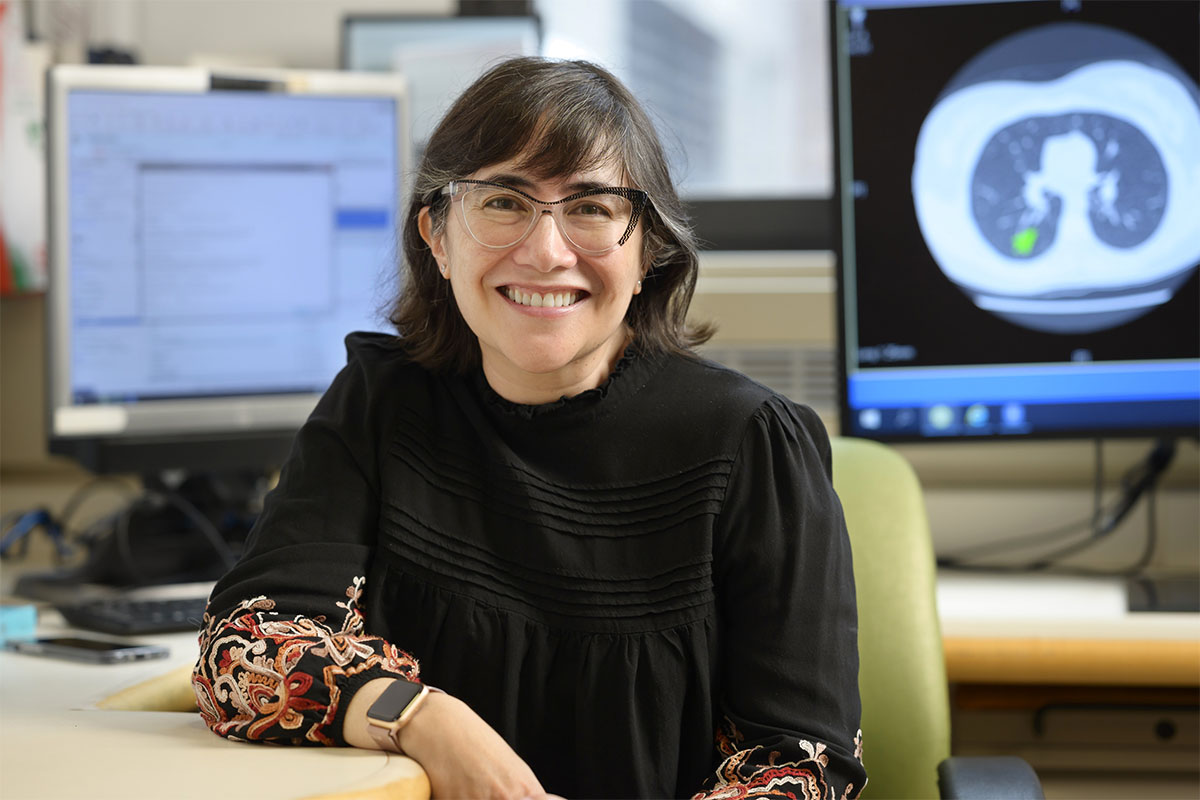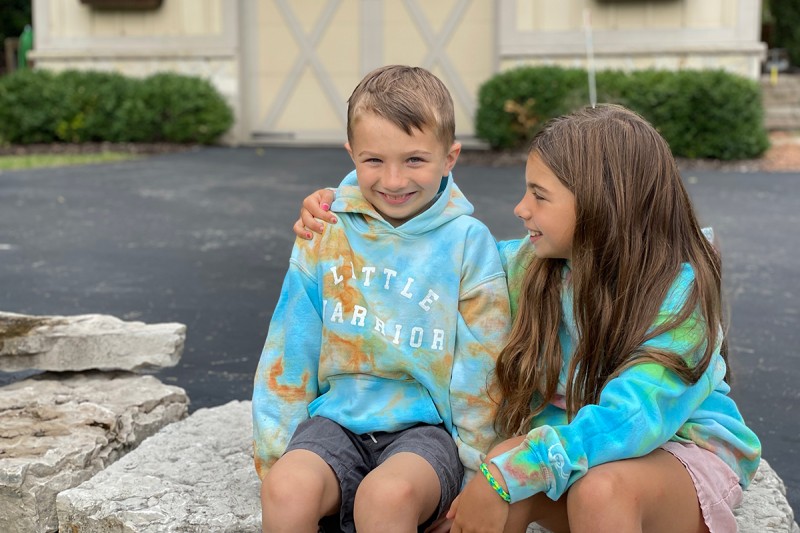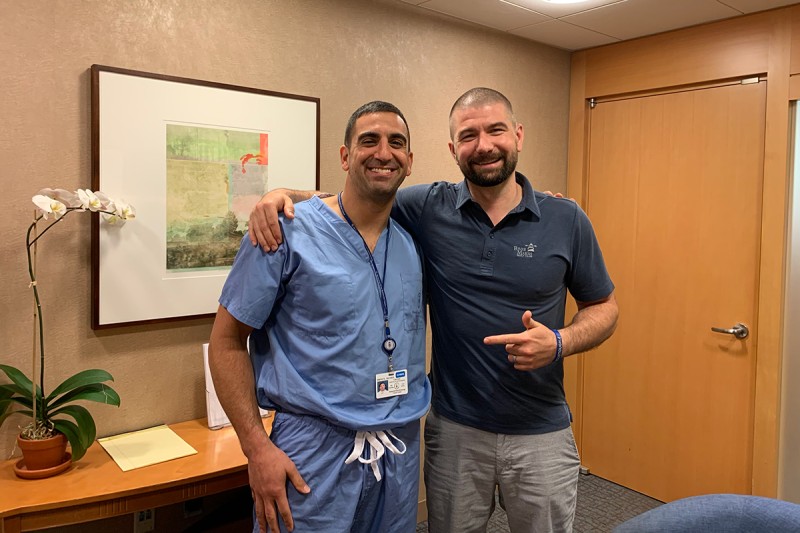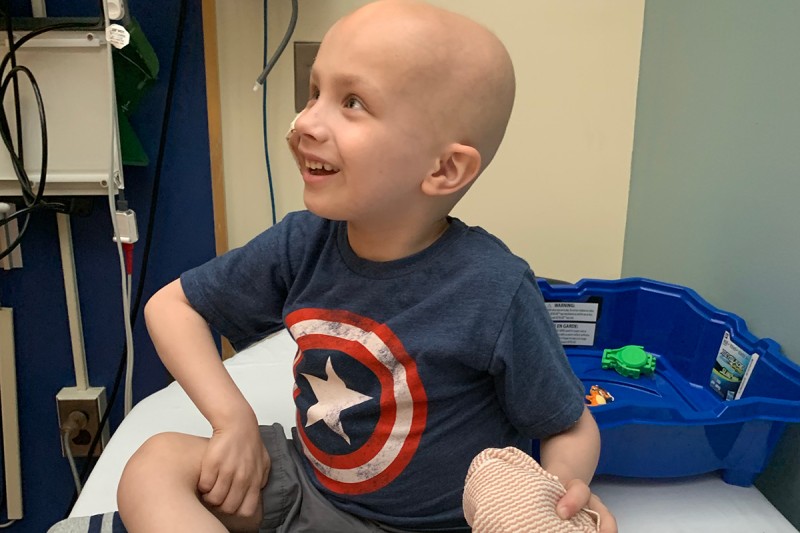- MSK has special expertise in treating childhood cancers like Ewing sarcoma — which usually starts in bone.
- A surgical technique called distraction osteogenesis allows children to be treated without amputation.
Heidi Frank has a quick answer when asked about her young son’s diagnosis with a rare cancer —and her family’s experience with MSK Kids, the nation’s largest pediatric oncology program at Memorial Sloan Kettering Cancer Center (MSK).
“I tell people, ‘We’re the luckiest of the unlucky.’ ” Heidi says, “We came out of this with a child in remission, which is incredible. And we have this team of rock star doctors and nurses caring for us. We just feel so fortunate to have our son in their care.”
Now the Frank family — and others — are helping parents and children facing Ewing sarcoma and similar cancers, by funding clinical research at MSK.
Troubling Symptoms and an ER Visit
Heidi and Tim Frank learned their son, Gus, had Ewing sarcoma when he was just 4 years old.
“He came home from preschool crying, saying his leg hurt — and he’s a tough kid,” recalls Heidi. “The pain didn’t stop, and we took him to urgent care. After an X-ray, the doctor told us to take him straight to the emergency room because he had a huge lesion in his bone.”
Doctors first thought he might have an infection. But tests revealed the lesion was caused by cancer. Eventually, the cancer was narrowed to a specific diagnosis — Ewing sarcoma.
What Is Ewing Sarcoma?

“Sarcoma is cancer of the connective tissue, so things like bone, muscle, and cartilage,” says Emily Slotkin, a pediatric oncologist at MSK who specializes in treating people with sarcoma and who would eventually care for Gus. “Ewing sarcoma in particular usually starts in a bone but can arise in the soft tissue and is defined by a specific genetic change in the DNA of the tumor cells.”
Once the Franks had a definite diagnosis, they researched the disease intensely, looking for a hospital that offered their son the best shot at a good outcome. Heidi says the Franks learned two lessons.
“First, question everything,” she advises. “And second, make sure you advocate for your child.”
Heidi and Tim’s research convinced them they may need to seek treatment outside their home in Lake Country, Wisconsin, a suburb of Milwaukee. Ewing sarcoma is diagnosed in around 250 people each year in the U.S. “At any given time, I think there are probably two pediatric patients at our home hospital in Wisconsin being treated for this cancer,” says Heidi.
MSK’s Expertise in Diagnosing and Treating Ewing Sarcoma
In contrast, MSK is a long-standing pioneer in treating Ewing sarcoma.
The tumor was named in 1921 for MSK doctor James Ewing, who did groundbreaking work on the disease as a pathologist (a doctor who specializes in diagnosis). Years later, MSK experts were the first to identify certain genetic changes that are unique to Ewing sarcoma, which is how this particular cancer is diagnosed.
Today, MSK has specialized expertise in treating the disease. Dr. Slotkin says, “At MSK, we treat one of the largest groups of Ewing sarcoma patients in the world.”
Heidi and Tim also learned about an important surgical technique used at MSK.
“At home, we were told that Gus should have a rotationplasty,” explains Heidi. “That’s a kind of amputation that would mean a prosthetic leg below the knee. We thought, ‘Isn’t there something else out there?’ And we started digging.”
They were intrigued when they found MSK’s Daniel Prince, an orthopedic surgeon who specializes in the care of children and young adults with bone tumors and other diseases of the bone. Dr. Prince is an expert in a treatment called distraction osteogenesis, which relies on the body’s natural ability to regrow bone after it is removed during cancer surgery.
The procedure involves removing the segment of bone containing the tumor and inserting a metal rod that very slowly stretches one end of the remaining bone over the course of months. This tricks the body into thinking there is a fracture, which triggers the healing process. Once the bone is fully healed, it becomes as strong as the original bone, which is crucial for a child who should be able to enjoy a long life after successful treatment.
“We read about Dr. Prince and came to MSK to meet the sarcoma team. It was eye-opening to come to Manhattan from our small Wisconsin town,” says Heidi. “When I look back, we were like deer in the headlights.”
How the MSK Kids Team Supports the Whole Family
“We knew we were making a huge leap of faith,” Heidi recalls. “We had no family or friends in Manhattan, and we knew we would be here for weeks or months at a time.” To her surprise, Heidi says: “The care team for Gus became like a family for us. They were so compassionate, and the care was so individualized. We became lifelong friends with our team.”
That nurturing support was crucial during Gus’ recovery from successful surgery, followed by intense chemotherapy. “Gus was really good-natured about everything he had to go through to get healthy,” recalls Heidi. “Which was particularly amazing when I remember how weak and sick he often felt. But he didn’t complain.”
That sentiment is shared by Dr. Slotkin, who oversaw Gus’ treatment after surgery. “Gus is so tolerant and coped with everything so well,” she says. “And he’s such a great kid — funny and confident and spicy!”
Heidi and Tim say that during the long course of Gus’ treatment and recovery, a special bond was forged with Dr. Slotkin. “One of the reasons I became a pediatrician is because you develop deep, long-term relationships with your patient and their family,” says Dr. Slotkin. “It’s so gratifying to provide support to people when they are going through such a stressful experience with their child.”
For her part, Heidi says: “Dr. Slotkin is exactly what you want in a pediatric oncologist. One minute she’s talking to Gus, comparing Superman and Spiderman. The next minute she is an expert who answers all our questions about the latest research we’ve found online — which, of course, she already knew all about. She’s just remarkable.”
Helping Other Families Facing Ewing Sarcoma
Gus is now 8 years old and in remission from cancer, even as his treatment continues to help lengthen his femur as he grows. The Frank family is intent on helping other kids and parents facing Ewing sarcoma and has become part of the Little Warrior Foundation, which advocates for kids facing this disease and helps fund research. Gus’ older sister, Susan, has even contributed to the cause by raising money in community fundraisers.
Among the projects funded by the Franks and other families through Little Warrior is a clinical trial whose principal investigator is Dr. Slotkin. Also supporting the trial is the Friedman/Morrison family in honor of Eli, whose parents describe him as having a huge smile and insatiable curiosity. He is such a positive and enthusiastic 8 year old boy that he earned himself the nickname “The Mayor at MSK.”
Dr. Slotkin explains about the trial that “it investigates a new drug that is part of a group of novel agents called DNA damage response inhibitors. The cancer cells that the drug targets have an abnormally high amount of damage to their DNA. Because of the DNA damage, these cancer cells should die — but they don’t and instead grow for some reason.”
DNA damage response inhibitors attempt to push the cancer cells to become even more abnormal, making them more vulnerable to chemotherapy or even killing the cancer cells outright. Dr. Slotkin says, “Eventually, we hope that therapies like this will make treatment for Ewing sarcoma less grueling and also kill off small pockets of cancer cells that can remain after treatment, leading to relapse.”
The efforts of families like the Franks and the Friedman/Morrisons are particularly important because funding for childhood cancer research often falls far short of need. “I can’t say enough about the Franks,” says Dr. Slotkin, “They are such wonderful partners in the treatment of their son and in helping other families facing sarcoma.”
For Heidi, Tim, and Gus, that kind of relationship is exactly what the doctor ordered. “For us, there’s simply no one else like the providers at MSK Kids. This is the team for our family, and it always will be.”


